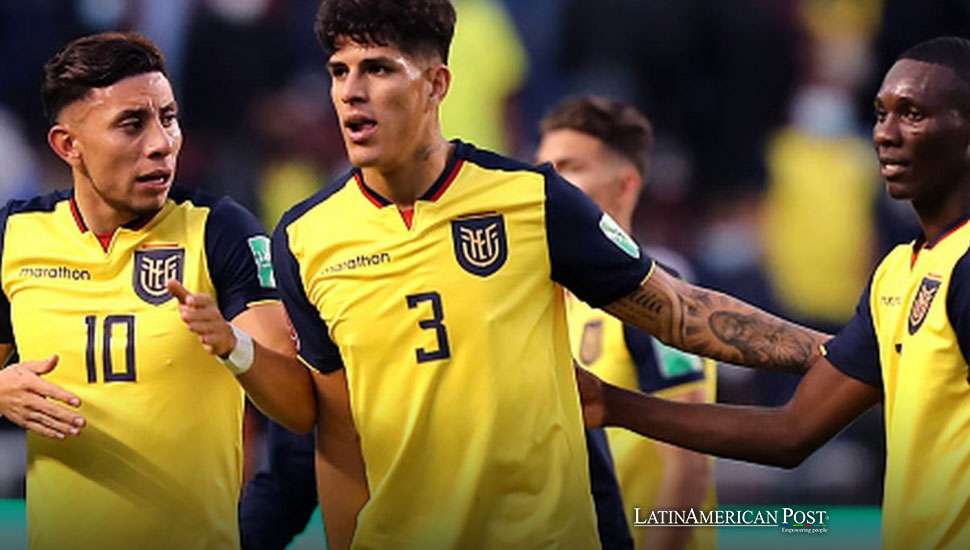Nightlife Controversy Shadows Ecuadorian Soccer Stars

Ecuador’s soccer federation (FEF) faces scrutiny after images surfaced of players in a New York nightclub post-match, sparking debate on professionalism and discipline in Latin American soccer and its impact on international reputation and player conduct.
Ecuadorian Soccer Players’ Nightclub Controversy Sparks Debate
In a recent incident that has stirred the sports community, the Ecuadorian Soccer Federation (FEF) announced it would reconsider player selections after photos of Ecuadorian soccer players partying in a New York nightclub went viral. This event occurred following Ecuador’s 2-0 friendly match victory over Guatemala, casting a shadow over their win and sparking a broader discussion on player professionalism and discipline in Latin American soccer.
The players in question, including defender Robert Arboleda, forward Gonzalo Plata, and the underage midfielder Kendry Páez, were seen engaging in revelry, with Arboleda notably throwing money at scantily clad dancers. This incident has ignited conversations across the continent about the expectations and responsibilities of professional athletes, particularly in the high-stakes realm of international soccer.
In Latin America, soccer is not just a game but a deeply ingrained cultural phenomenon. Players’ actions, both on and off the field, are intensely scrutinized by the public and the media. Therefore, the Ecuadorian players’ nightclub outing resonates beyond Ecuador’s borders, touching on broader themes of discipline, professionalism, and the role of athletes as public figures in Latin American societies.
In response to the incident, the FEF expressed its disappointment, stating that the players’ actions contradicted the values and principles the institution upholds. This scenario is not unique to Ecuador but reflects a recurring theme in Latin American soccer, where the line between personal freedom and professional responsibility often blurs.
Complex Dynamics of Player Discipline in Latin America
Player discipline in Latin America is complex, influenced by factors like sudden fame, economic pressures, and cultural norms. For example, in Brazil, soccer stars often rise from humble beginnings to achieve immense wealth and fame, a trajectory that can challenge their personal discipline and professional focus. Similarly, in Argentina and Colombia, where soccer is akin to a religion, players frequently navigate the pressures of intense public scrutiny and the temptations of fame.
The nightlife controversy in Ecuador is reminiscent of other regional incidents, such as the 2018 scandal involving Mexican players before the World Cup or the frequent media coverage of Argentine players’ off-field activities. These instances highlight the ongoing struggle within Latin American soccer to balance player freedom with the expectations of professionalism and discipline.
The players involved in the New York nightclub incident, particularly Arboleda and Plata, defended their right to personal leisure, sparking a debate about how athletes can engage in off-field activities without compromising their professional obligations. This discussion is crucial in understanding the societal expectations placed on soccer players in Latin America, where the sport is a career and a public trust.
The reaction to the players’ behavior underscores the delicate balance between respecting their time and ensuring that their actions do not detract from their professional commitments or tarnish the team’s reputation. This balance is particularly challenging in the age of social media, where athletes’ private lives are under constant public scrutiny.
FEF’s Decision: Implications for Player Careers
The FEF’s decision to consider these actions in future team selections sends a clear message about the federation’s stance on discipline and professionalism. This move could have implications for the players’ careers, especially for young talents like Kendry Páez, who is set to join Chelsea. It highlights the importance of maintaining a positive image and adhering to the ethical standards expected of professional athletes.
The incident and its fallout are a microcosm of Latin American soccer’s broader challenges regarding player conduct. While the region is renowned for producing world-class talent, the off-field behavior of its players often becomes a focal point of attention, raising questions about the cultural and systemic factors influencing their actions.
Also read: Brazilian Soccer Star Dani Alves Secures Release from Jail
In conclusion, the nightlife controversy involving Ecuadorian players in New York serves as a reminder of the ongoing challenges in managing player behavior in Latin American soccer. It emphasizes the need for clear guidelines and consistent enforcement of disciplinary measures to uphold the sport’s integrity and ensure that players remain positive role models for fans across the region and beyond. As Latin American soccer continues to evolve, the professionalism and discipline of its players will remain central to its success on the international stage.





